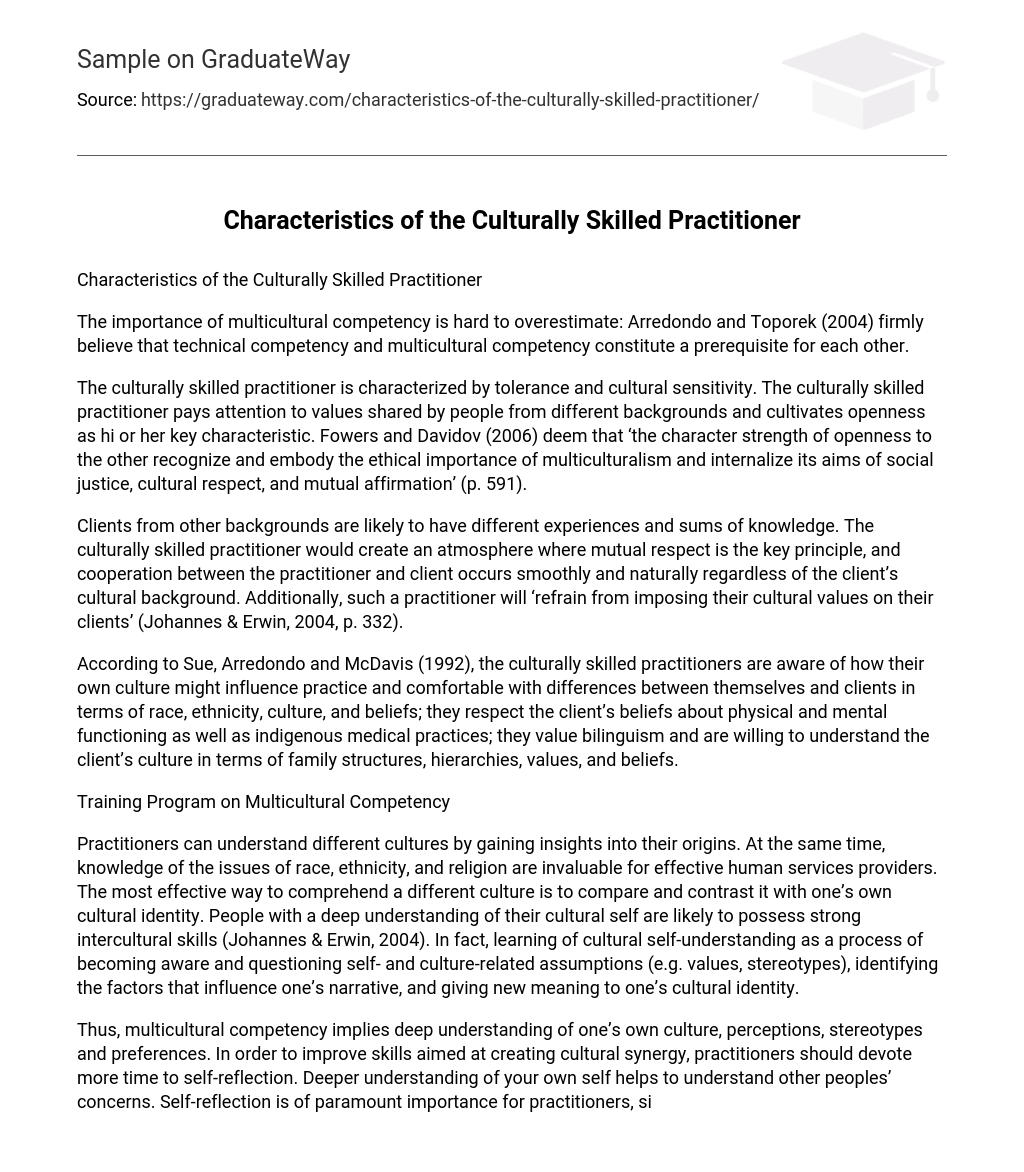The importance of multicultural competency is hard to overestimate: Arredondo and Toporek (2004) firmly believe that technical competency and multicultural competency constitute a prerequisite for each other.
The culturally skilled practitioner is characterized by tolerance and cultural sensitivity. The culturally skilled practitioner pays attention to values shared by people from different backgrounds and cultivates openness as hi or her key characteristic. Fowers and Davidov (2006) deem that ‘the character strength of openness to the other recognize and embody the ethical importance of multiculturalism and internalize its aims of social justice, cultural respect, and mutual affirmation’ (p. 591).
Clients from other backgrounds are likely to have different experiences and sums of knowledge. The culturally skilled practitioner would create an atmosphere where mutual respect is the key principle, and cooperation between the practitioner and client occurs smoothly and naturally regardless of the client’s cultural background. Additionally, such a practitioner will ‘refrain from imposing their cultural values on their clients’ (Johannes & Erwin, 2004, p. 332).
According to Sue, Arredondo and McDavis (1992), the culturally skilled practitioners are aware of how their own culture might influence practice and comfortable with differences between themselves and clients in terms of race, ethnicity, culture, and beliefs; they respect the client’s beliefs about physical and mental functioning as well as indigenous medical practices; they value bilinguism and are willing to understand the client’s culture in terms of family structures, hierarchies, values, and beliefs.
Training Program on Multicultural Competency
Practitioners can understand different cultures by gaining insights into their origins. At the same time, knowledge of the issues of race, ethnicity, and religion are invaluable for effective human services providers. The most effective way to comprehend a different culture is to compare and contrast it with one’s own cultural identity. People with a deep understanding of their cultural self are likely to possess strong intercultural skills (Johannes & Erwin, 2004). In fact, learning of cultural self-understanding as a process of becoming aware and questioning self- and culture-related assumptions (e.g. values, stereotypes), identifying the factors that influence one’s narrative, and giving new meaning to one’s cultural identity.
Thus, multicultural competency implies deep understanding of one’s own culture, perceptions, stereotypes and preferences. In order to improve skills aimed at creating cultural synergy, practitioners should devote more time to self-reflection. Deeper understanding of your own self helps to understand other peoples’ concerns. Self-reflection is of paramount importance for practitioners, since modern racism is frequently implicit and unconscious (Dovidio et al, 2002).
According to the American Psychological Association (2003), practitioners should understand that, by virtue of being culture bearers, they might hold attitudes and beliefs that can have a negative impact on their views of and interactions with clients who are ethnically and racially different from themselves; acknowledge the significance of multicultural sensitivity and responsiveness to, knowledge of, and understanding about ethnically and racially different clients; use the constructs of multiculturalism and diversity in psychological education; acknowledge the importance of conducting culture-centered and ethical psychological research among persons from ethnic, linguistic, and racial minority backgrounds; employ culturally appropriate skills in clinical practice; and endorse culturally informed organizational and policy development.
Stuart (2004) translates all the aforementioned theoretical assumptions into twelve practical steps needed to achieve multicultural competency. These steps include cultivating skill in understanding the client’s cultural outlook; becoming aware of and controlling biases; cultivating sensitivity to cultural differences without focusing on them excessively; distinguishing between theory and culture; elaborating on a set of diverse cultural categories; reassessing the methods used to collect culturally relevant data before applying the findings
in clinical practice; developing a means of determining a person’s acceptance of cultural constructs; finding out a means of determining the significance of ethnic identity for each client; applying psychological tests relevant for client’s characteristics; contextualizing assessments; regarding clients’ ethnic and world views in selecting therapists, intervention goals, and methods; being respectful to the clients’ beliefs, yet trying to alter them id it is absolutely necessary.
References
American Psychological Association. (2003). ‘Guidelines on Multicultural Education, Training, Research, Practice, and Organizational Change for Psychologists.’ American Psychologist, 58(5), 377–402.
Arredondo, P., & Toporek, R. (2004). ‘Multicultural Counseling Competencies = Ethical Practice.’ Journal of Mental Health Counseling, 26, 44-55.
Dovidio, J.F., Gaertner, S.E., Kawakami, K, Hodson, G. (2002). Why Can’t We Just Get Along? Interpersonal Biases and Interracial Distrust. Cultural Diversity and Ethnic Minority Psychology, 8(2), 88-102.
Fowers, B.J., & Davidov, B.J. (2006). ‘The Virtue of Multiculturalism: Personal Transformation, Character, and Openness to the Other.’ American Psychologist, 61(6), 581-594.
Johannes, C.K., & Erwin, P.G. (2004). ‘Developing multicultural competence: Perspectives on theory and practice.’ Counselling Psychology Quarterly, 17(3), 329–338.
Stuart, R.B. (2004). Twelve Practical Suggestions for Achieving Multicultural Competence. Professional Psychology: Research and Practice, 35(1), 3-9.
Sue, D. W., Arredondo, P., & McDavis, R. J. (1992). Multicultural counseling competencies: A call to the profession. Journal of Counseling and Development, 70, 477-486.





